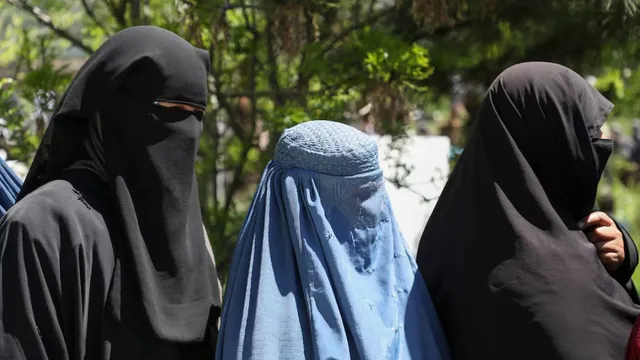- By Supratik Das
- Tue, 01 Jul 2025 05:51 PM (IST)
- Source:JND
A major step that has opened up heated debate in the country, Kazakhstan, a Central Asian republic where over 70 per cent of people are Muslim, has banned the wearing of face-covering attire like the burqa and niqab in public areas. President Kassym-Jomart Tokayev signed the new law on June 30, 2025, which is intended to advance public safety and protect the secular nature of the state. As per the new act, all clothing that "prevents facial recognition" is barred from public spaces. The law permits exemptions on medical grounds, extreme weather, civil defense needs, official responsibility, or taking part in sporting events and cultural activities.
While the law does not directly name religious garments, its implications are clear, traditional Islamic attire such as the niqab and burqa, which cover a woman’s face entirely or partially, are effectively restricted. The government believes face-covering dress hinders officers from being able to recognize people, making it potentially unsafe and making prevention of crime more complicated. President Tokayev has been in outspoken criticism of face-covering attire. In the early part of this year, he had called the niqab an "old and unnatural dress" that is not representative of Kazakhstan's original cultural values. He has been urging citizens, particularly women, to adopt national costumes on many occasions. "Instead of dressing in black robes covering the face, it is preferable to dress in our national attire, which highlights our distinct ethnic identity," Tokayev stated in a release in March 2024. The President, a practicing Muslim himself who celebrates Ramadan and has fulfilled Umrah in Mecca, asserts that the policies of Kazakhstan should be kept secular, according to its Constitution.
Growing Religious Conservatism a Raising Concern
Official said it was a response to apprehensions regarding the dissemination of outside religious ideologies, particularly more conservative versions of Islam such as Salafism, on social media and online forums. Domestic news outlets report that there have been increasing numbers of women in cities such as Astana and Almaty covering up and wearing black cloaks and niqabs dress that had not been a part of traditional Kazakh attire. "Such trends are unfamiliar to us history and tradition," a senior Kazakh government official said in a statement to state media. "The growth of fully covered women reflects an influence that is not consistent with Kazakhstan's secular and cultural values," he added.
Kazakhstan's fresh face-covering ban extends previous restrictions. In 2017, the nation prohibited hijabs for schoolgirls, citing schools should be secular institutions where religious symbols are not visible. In 2023, this was applied to all students and instructors in schools across the country. More than 150 girls were said to have refused to go to classes in protest at the time, but President Tokayev remained firm, insisting schools should focus on education rather than religious expression.
Part Of A Larger Central Asian Trend
The action taken by Kazakhstan fits within a larger regional trend. A number of Central Asian countries have imposed recent bans similar to this one:
• Kyrgyzstan prohibited the niqab in public in January 2025. Violators of the ban can be fined as much as 20,000 Kyrgyz som over half of the nation's average monthly wage. The authorities have conducted street patrols to ensure the law is obeyed.
• Uzbekistan has imposed fines for niqab wearing since 2023 on grounds of maintaining public order and national traditions.
• Tajikistan, a country in which 96 per cent of the people are Muslim, enacted a comprehensive law in 2024 prohibiting clothing "alien to national culture", including the hijab. Offenders are liable to heavy fines, with heavier punishments for government officials and religious figures.
• There is no direct prohibition in Turkmenistan but prescribing the use of traditional national attire on formal occasions and public events indirectly discourages face-covering Islamic dress.
ALSO READ: Pakistan Assumes UNSC Presidency For July Amid Rising Global Crises
Balancing Faith And Secular Governance
Kazakhstan is officially secular in spite of its Muslim majority. The Constitution enshrines freedom of religion, but also provides for the principle that the state shall remain independent of religious influence. President Tokayev and other senior leaders have consistently emphasized that while Islam is a significant element of the nation's cultural heritage, the laws and policies of Kazakhstan should continue to be rooted in secularism and national identity.
ALSO READ: Nearly 10,000 Millionaires To Relocate To UAE In 2025: Here's What Report Says
The prohibition has evoked a mixed reaction. People in support of the ban believe that it will assist in upholding Kazakhstan's reputation as a secular, moderate nation that disapproves of extremism. Opponents claim it encroaches upon personal religious freedom and may disproportionately harm women who opt to use the niqab or burqa as a symbol of religion. The new legislation is now officially in effect following the President's signature. Government departments are set to release detailed implementation guidelines over the coming weeks. For the present, the prohibition serves to express a stark message from Astana, Kazakhstan is determined to protect its secular laws, advance its cultural traditions, and resist what it perceives as undesirable external religious interference.

